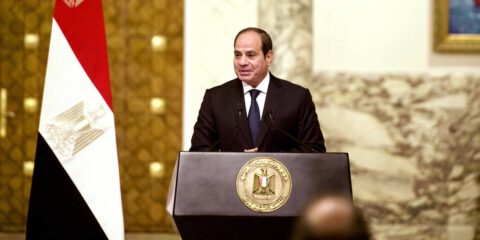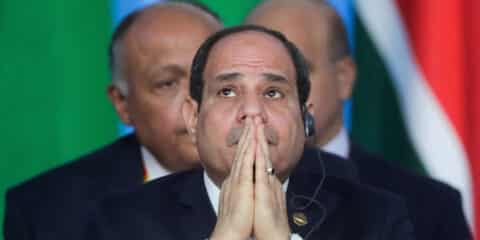תמיכתה הפומבית של מצרים בהסכמי השלום ובנורמליזציה בין ישראל לאיחוד האמירויות, בחריין וסודאן היא אחד מסממניה ויתרונותיה של השותפות בין ישראל למצרים באגן המזרחי של הים התיכון.
ממשלת מצרים קידמה בברכה ואף בחום את הסכמי הנורמליזציה בין ישראל לשלוש ממדינות ערב, ביניהן גם סודאן, שעימה יש למצרים יחסי השפעה מסועפים ומורכבים. היא גם מנעה דיון בליגה הערבית בדרישות הפלסטיניות. כל זה שונה מאוד מדפוסי ההתנהגות של קהיר בעבר, ויש לראותו, בפועל, כאחד התגמולים החשובים שישראל זוכה להם בשל מחויבותה למערך הכוחות החדש בים התיכון.
בכל הנוגע לסימון גבולות המים הכלכליים ולמאבק הכרוך בכך על עתידה של לוב, העניקה ישראל גיבוי מפורש לעמדה היוונית והמצרית, לנוכח פרובוקציות מצד ארדואן, תוך דחיית התביעות התורכיות-לוביות. עמדה זו היא חלק חשוב בשותפות שהתהוותה בין ישראל לבין מצרים, איחוד האמירויות וצרפת. כמו כן, במקביל לפגישת הפסגה בניקוסיה של סיסי, אנסטדיאדס ומיצוטאקיס ב-21 באוקטובר התקיימו באתונה ביקורים של השר לשיתוף פעולה אזורי, אופיר אקוניס, שחתם על תוכנית לשיתוף פעולה שבה ישולבו יוון, קפריסין, האמירויות ובחריין לצד ישראל, ושל שר החוץ גבי אשכנזי, שנטל חלק במפגש תקופתי משולש עם עמיתיו מקפריסין ויוון.
התפתחויות אלה הן בגדר אבני בניין של מערך אזורי חדש שחשיבותו רבה מאוד בשעה זו, במיוחד עבור מצרים. חיוני עבור ישראל לקיים שיתוף פעולה ים-תיכוני הדוק בעידן אי-הוודאות שלפנינו, ולהסתמך על הסימנים הגוברים לכך שארה”ב ואירופה מאבדות את סבלנותן לנוכח עמדותיו התוקפניות של נשיא תורכיה, ארדואן.
עמדת מצרים
מפגש הפסגה התלת-צדדי השמיני של מנהיגי מצרים, יוון וקפריסין התקיים בניקוסיה ב-21 באוקטובר 2020. ההודעה המשותפת שפורסמה בתום הפסגה התמקדה בצורך להתמודד עם ההשלכות של שאיפותיו הנאו-עות’מאניות הגלויות של ארדואן, שהולכות ונעשות מסוכנות. רשימת הפרובוקציות שלו הולכת ומתארכת, וכוללת הפרות של הריבונות היוונית והקפריסאית. מצרים מאשימה את תורכיה במה שהיא מתארת כתמיכה בטרור, וכוונתה לתפקידה של תורכיה במתן חסות ומקלט לפעילי האחים המוסלמים שנמלטו ממצרים ולאנשי חמאס. הוזכרה גם הנוכחות התורכית המתהדקת והולכת בצפון סוריה. חשיבות מיוחדת נודעת לשני מזכרי הבנה שנחתמו עם “ממשלת ההסכמה הלאומית” של פואד סראג’ במערב לוב. הראשון מביניהם מתיימר להתוות גבול משותף בין המים הכלכליים של תורכיה ולוב במזרח הים התיכון, באופן הנוגד את אמנת חוק הים של האו”מ, UNCLOS, והשני מסדיר אספקת נשק וסיוע צבאי, כולל כוחות תורכיים וגורמי מיליציה סוריים, לממשלת ה-GNA, באופן הנוגד את החלטת מועצת הביטחון על אמברגו נשק ללוב.
מטבע הדברים, רשימה זו של אתגרים חמורים היא הניצבת בראש מעייניהם של שלושת המנהיגים – סיסי, מיצוטאקיס ואנסטדיאדס. בפועל, סיסי כבר איים בהתערבות צבאית מצרית בהיקף מלא אם תימשך ההתקדמות של כוחות ה-GNA מזרחה לעבר בנגאזי (ומתח “קו אדום” בין ג’ופרא לסירת). האיום הספיק כדי לשוב ולייצב שיווי משקל רופף בזירה הלובית, ולאפשר את תחילתן של שיחות בין הצדדים הלוחמים בסוגיות מעשיות.
למיקוד זה של סדר העדיפויות יש, בהכרח, השפעה גם על היחס כלפי ישראל. ההצהרה המשותפת כללה אומנם אזכור סטנדרטי של הצורך בפתרון ישראלי-פלסטיני על בסיס קווי 1967 ובירה פלסטינית בירושלים, בדומה לקודמותיה במפגשי פסגה אלה. עם זאת היא גם קידמה בברכה, בלשון מפורשת, את “הסכמי אברהם” עם איחוד האמירויות ועם בחריין, והגדירה אותם כתרומה לשלום וליציבות באזור. זהו שינוי חד בהשוואה לגישה המצרית בעבר, שהייתה צוננת מאוד, שלא לומר עוינת, כלפי ה”תטביע”, נרמול, עם ישראל. רבים באזור זוכרים עדיין היטב כיצד נהג לפני שנות דור שר החוץ המצרי דאז, עמרו מוסא, להוקיע את ה”הרוולה”, ריצת רגליים להרע של מדינות באזור לחיקה של ישראל. כעת פרסמה מצרים, בנוסף להודעה המשותפת, הצהרות ברכה משלה ל”הסכמי אברהם”, ובהמשך העניקה גיבוי מלא וחד-משמעי להחלטתה של סודאן להתחיל בצעדים לקראת נורמליזציה.
שני מכלולי הנושאים, האיום התורכי והתגובה להסכמי הנורמליזציה, כרוכים זה בזה. עבור יוון, האתגר התורכי היה הראשון במעלה בחשיבותו מאז ומתמיד, היינו מאז קמה יוון המודרנית בשנות ה-20 של המאה ה-19 תוך כדי התקוממות נגד העות’מאנים. כך הם פני הדברים גם עבור קפריסין, בוודאי מאז הפלישה בקיץ 1974 והקמת “הרפובליקה התורכית של צפון קפריסין”, TRNC. לאחרונה, פתיחתה למבקרים של העיר הנטושה וארושה בקרבת פמאגוסטה, שהתרוקנה מתושביה היוונים והפכה לעיר רפאים בשטח ההפקר, נתפסה באתונה ובניקוסיה כפרובוקציה נוספת, בהמשך לפעילות הימית התורכית. החששות בצד היווני הם עמוקים ומבוססים.
מדוע גם מצרים מתמקדת כעת באתגר התורכי? בראייה היסטורית, ההנהגה המצרית הרי לא ראתה בעין יפה את האפשרות ש”השכנה הקטנה בצפון מזרח” (ישראל) תמלא תפקיד אסטרטגי מוביל במערכת האזורית. הלכי הרוח בציבור המצרי כלפי ישראל עדיין עוינים, במיוחד בקרב העילית האינטלקטואלית והתרבותית. אף על פי כן, עדיפויות פוליטיות ואידאולוגיות אחרות, כמו גם שיקולים גאו-אסטרטגיים וכלכליים, הובילו לתפנית מהותית בהתייחסותה של מצרים, כמדינה, כלפי ישראל.
ההנהגה המצרית הנוכחית נתפסת ומוצגת על ידי ארדואן כחבורה של חומסי שלטון בלתי לגיטימיים. כך הם פני הדברים מאז הדחתם של הנשיא מוחמד מורסי והאחים המוסלמים מן השלטון ביולי 2013, והדיכוי העקוב מדם של מפגיני האח’ואן ברובע ראבעה אל-עדוויה בקהיר כחודש לאחר מכן. יש בתורכיה נוכחות פעילה של אלמנטים מקרב האחים המוסלמים שהנשיא עבד אל-פתאח אל-סיסי רואה בהם איום קיומי. במושגים כלליים יותר, ארדואן הציב את עצמו ואת מפלגתו, AKP, כפטרון של הכוחות הפוליטיים האסלאמיסטיים באזור ומעבר לו, כפי שהדבר בא לידי ביטוי גם בתגובתו הקיצונית להתבטאויותיו של נשיא צרפת. הוא גם מפגין בראש חוצות סממנים של שאיפות נאו-עות’מאניות. עד כמה שהדברים נוגעים לנשיא מצרים, עמדות אלה הופכות את תורכיה לאיום החמור ביותר עבור מצרים, ועבורו אישית – על מעמדו ואף על שרידותו.
מאז 2014 באה יריבות זו לידי ביטוי במלחמה באמצעות שליח (proxy) בלוב. המצב בזירה זו החמיר ב-2019: ראשית, כאשר “הצבא הלאומי הלובי” (LNA) בהנהגתו של הפילדמרשל ח’ליפה חפתר, הנתמך על ידי מצרים, עלה על טריפולי והטיל מצור על “ממשלת ההסכמה הלאומית” (GNA) המסתייעת בתורכיה. בתגובה, כאמור לעיל, חתמה תורכיה על שני מזכרי ההבנה עם סראג’, ואז התערבה תוך שימוש בכוח. במאי 2020 הובילה התערבות תורכית זו למפלה של ה-LNA, לאובדן הבסיס האווירי אל-וואטייה במערב לוב ולנסיגת כוחותיו של חפתר לקו סירת-ג’ופרה. מכאן החשיבות, עבור מצרים, של מתיחת ה”קו בחול” בלוב והאזהרה כי אם תחצינה אותו המיליציות של הGNA- תתערב מצרים צבאית במלוא כוחה, ובמקביל של בניית מערך כוחות במזרח הים התיכון, ובכלל זה גם ישראל, כגורם מאזן כנגד כוחו של ארדואן.
יתרה מזאת, מפת המים הכלכליים, כפי ששורטטה על ידי תורכיה וממשלת סראג’ במזרח הים התיכון, מאיימת למנוע ממצרים גישה לשווקים האירופיים עבור הגז המופק משדה “זוהר” ושדות נוספים בים התיכון. גם במקרה זה, האינטרסים של מצרים עולים בקנה אחד עם אלו של ישראל וקפריסין. המדיניות התורכית נראית כמכוונת להציב אתגר לכל השלוש, וכן ליוון, שהמפה התורכית מתעלמת באופן בוטה מזכויות המים הכלכליים שלה סביב האיים שבריבונותה, כמו כרתים ורודוס. המשבר החריף בשבועות האחרונים, ואף בימים שלאחר רעידת האדמה, למרות הצעות העזרה של ישראל, מצרים ויוון, בשל התעקשותה של תורכיה לשגר ספינות מחקר סייסמי (“ארוצ’ ראיס” ו”ברבארוס”) לאזורים בים התיכון שהיא תובעת לעצמה במסגרת תפיסת “המולדת הכחולה” (Mavi Vatan) שאותה אימץ ארדואן בשנים האחרונות.
יתרה מזאת, הצורך המצרי בשיתוף פעולה עם ישראל מעוגן לא רק בהתמודדות עם האתגר התורכי, אם כי הוא מתבלט כגורם העיקרי והמיידי. מזה שנים מספר, שתי המדינות פועלות בשיתוף פעולה הדוק כדי להביס את האיום הנובע מן הפעילות בסיני של גורמים המזוהים עם דאע”ש. התמיכה של ישראל בעמדות מצרים בוושינגטון, ובייחוד בגבעת הקפיטול, גם היא חשובה מאוד לסיסי. הקשרים האסטרטגיים עם ארה”ב נותרו חיוניים וללא תחליף עבור ההנהגה המצרית ועבור צבאה, למרות יחסיה הטובים עם סין ורוסיה.
בכל מקרה, גם שיקולים אלה של הביטחון הלאומי המצרי ארוגים כיום במהודק עם הממד הים-תיכוני. כפי שמציינת ההודעה המשותפת של 21 אוקטובר, מצרים רואה במערכה נגד הטרור במזרח הים התיכון מאמץ משותף, על-לאומי. גם מעמדו של סיסי בוושינגטון צפוי להתחזק אם יוכל להציג את עצמו במרחב הציבורי והפוליטי האמריקני כבעל בריתן של ישראל ויוון, שלשתיהן יש בסיס תמיכה ציבורי רחב וחזק בארה”ב. התחזקות זו של סיסי צפויה לחול משני עברי המתרס הפוליטי בארה”ב, אף על פי שדמוקרטים רבים אינם חשים אהדה כלפיו.
תפקידה של ישראל
לפיכך הממד הים-תיכוני של המדיניות המצרית, כמו גם שיקולים אחרים וביניהם המצב בסיני, מתבלט כאחת הסיבות העיקריות למפנה שחל בהתייחסות המצרית לנורמליזציה בין ישראל למדינות ערביות. במהלך השנים האחרונות הפכה ישראל לשחקן מרכזי במהלכים לכינון מערך כוחות (;alignment המונח “ברית”, alliance, עדיין אינו הולם) במזרח הים התיכון. יוון וקפריסין בנו שתי מערכות משתלבות של ועידות פסגה משולשות; שמונה כאלה התקיימו עד כה עם מצרים, ושבע עם ישראל. אלו, בתורן, הביאו להחלטה על הקמתן של שתי מזכירויות קבועות ומקבילות בניקוסיה, שעדיין לא אוישו כנדרש, לניהול כל אחד מן המשולשים. לאחר מכן הוסכם בינואר 2019 על הקמת פורום הגז של מזרח הים התיכון (EMGF), ובספטמבר 2020 על הפיכתו לארגון אזורי רשמי.
התפקיד הישראלי מתבטא גם בפעילות צבאית ענפה. חיל האוויר, יחד עם עמיתים ממצרים ואיחוד האמירויות, נוטל חלק באופן סדיר בתרגיל השנתי Iniochos של חיל האוויר היווני, ומתקיימים תרגילים משותפים נוספים, כולל תרגיל ימי משותף בשילוב הצי האמריקני. חיל האוויר היווני משתתף בתרגיל הרב-לאומי הדו-שנתי Blue Flag בבסיס עובדה בנגב. בתוך כך, הכוחות המיוחדים של צה”ל מתאמנים באופן סדיר בלוחמה הררית בקפריסין, במתארים המדמים מבצעים בעומק לבנון.
באשר לעמדותיה הרשמיות והמשפטיות, ישראל כמו איחוד האמירויות הביעה תמיכה חד-משמעית בהסכם המצרי-יווני (6 אוגוסט 2020) שהציב מפה נגדית לזו של לוב ותורכיה. כאמור, ישראל גם יזמה את שילובן של מדינת איחוד האמירויות ושל בחריין בדיאלוג עם יוון וקפריסין לגבי תוכניות פיתוח אזוריות והשקעות כלכליות. הן אומנם אינן חלק מן הים התיכון, אך הן מעורבות מזה זמן במאבק על לוב ובתמיכה במשטר המצרי.
ביקורו באתונה של שר החוץ גבי אשכנזי לסבב של שיחות תלת-צדדיות בדרג שרי חוץ הוא נקודת ציון נוספת. עצם קיומו בתקופה המתוחה הנוכחית הוא ביטוי חשוב של תמיכה ביוון וקפריסין, ולכן גם במצרים. מעניין לציין שבאותו עיתוי כמו הסבב הטרילטרלי של שרי החוץ הגיע ליוון גם שר החוץ הרוסי סרגיי לברוב. בנסיבות שבהן רוסיה ותורכיה מתעמתות כל העת בסוריה, בלוב, ובמידת מה גם בנגורנו-קרבאך, מוסקבה רואה ככל הנראה בחיוב את ההתקרבות בין המדינות ההלניות יוון וקפריסין לבין ישראל. עבור מצרים, אשר פעלה בשיתוף פעולה הדוק עם הרוסים כדי לתמוך בכוחותיו של חפתר בלוב, זו הוכחה נוספת לכך שזירת הים התיכון היא המפתח לעתידה.
עקב כך, הנורמליזציה בין ישראל לבעלות ברית אחרות של מצרים, ובראשן האמירויות, הפכה בעיני קהיר לנכס, לא לנטל. מצרים ממשיכה אומנם להשמיע את הסיסמאות הפרו-פלסטיניות השגורות, והלכי הרוח ב”רחוב” המצרי, וליתר דיוק בקרב אלמנטים קולניים של העילית התרבותית והאינטלקטואלית, עדיין רוויים שנאה, אך בוויכוח הנוכחי על הנורמליזציה, שהפלסטינים נוקטים בו עמדה זועמת ושלילית, תגובתה החיובית של מצרים היא בעלת משמעות אסטרטגית.
המלצות למדיניות ישראל
כדי לתת ערך נוסף לשיקולים אלה בצד המצרי, המדיניות והפעילות הדיפלומטית של ישראל צריכות:
- לשקף במישרין, בדרג הבכיר ביותר, את ההערכה ושביעות הרצון נוכח עמדותיו של המשטר המצרי. נוכח האווירה במרחב הציבורי, נדרשה מן ההנהגה המצרית מידה של תעוזה כאשר בחרה להציג קו עקבי ותקיף של תמיכה בנורמליזציה.
- להמשיך במאמצים לחזק את מערך הכוחות בים התיכון על ידי מתן תוכן אופרטיבי ל-EMGF. כמו כן יש להקים ולאייש את המזכירות הטרילטרלית בניקוסיה, להכין את הפסגה המשולשת הבאה בין ישראל, יוון וקפריסין ולקדם קשרי סיוע ביטחוני וייצור משותף עם יוון וקפריסין.
- להתמקד בגיוס תמיכה בוושינגטון, משני עברי המתרס, למערך הכוחות הים-תיכוני. יש להיערך לדיאלוג אינטנסיבי עם הממשל ו/או עם צוות המעבר מייד לאחר הבחירות.
- לרתום את צרפת למעורבות פעילה בחיזוק מערך הכוחות הים-תיכוני, על רקע הקרע בינה לבין ארדואן, לאחר ששגריר צרפת באנקרה נקרא הביתה להתייעצויות בתגובה להשתלחויות של ארדואן במאקרון. צרפת יכולה למלא תפקיד במיתון או בשינוי העמדה האירופית בכללותה.
סדרת הפרסומים “ניירות עמדה” מטעם המכון מתפרסמת הודות לנדיבותה של משפחת גרג רוסהנדלר
תמונה: Bigstock








 - בניית אתרים
- בניית אתרים